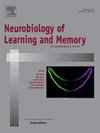Modelling Pavlovian biases in depressed and healthy young adults
IF 1.8
4区 心理学
Q3 BEHAVIORAL SCIENCES
引用次数: 0
Abstract
Pavlovian stimuli signalling potential punishment and reward have powerful effects on instrumental behaviours. For example, a cue associated with punishment will suppress well-learned instrumental responses. However, the degree to which Pavlovian stimuli interfere with the learning of instrumental responses is less well studied. In the current set of studies we investigated the effect of Pavlovian stimuli on instrumental learning and the extent to which depressive symptomatology moderated this relationship. We conducted two experiments using a sample of healthy adults and leveraged computational modelling to estimate learning parameters and the moderating role of depression on these learning parameters. In line with previous literature, participants found it more difficult to learn to make instrumental go and no-go responses in the presence of incongruent cues—for instance, making a “go” response for a cue which signalled punishment, and vice versa. Contrary to expectation we did not observe a reliable relationship between performance and depression scores; while Experiment 1 observed a relationship between depression and model-derived learning rates, these results were not replicated in Experiment 2. We discuss both the theoretical and practical implications of these findings in the General Discussion.
对抑郁和健康年轻人的巴甫洛夫偏见建模。
巴甫洛夫刺激表明潜在的惩罚和奖励对工具行为有强大的影响。例如,与惩罚相关的提示会抑制习得的工具性反应。然而,巴甫洛夫刺激在多大程度上干扰工具性反应的学习还没有得到很好的研究。在当前的一系列研究中,我们调查了巴甫洛夫刺激对乐器学习的影响,以及抑郁症状在多大程度上缓和了这种关系。我们使用健康成人样本进行了两个实验,并利用计算模型来估计学习参数以及抑郁对这些学习参数的调节作用。与之前的文献一致,参与者发现在不一致的提示下学习做出“走”和“不走”的反应更加困难,例如,对暗示惩罚的提示做出“走”的反应,反之亦然。与预期相反,我们没有观察到表现与抑郁评分之间的可靠关系;虽然实验一观察到抑郁与模型衍生学习率之间的关系,但这些结果在实验二中没有得到重复。我们将在一般性讨论中讨论这些发现的理论和实践意义。
本文章由计算机程序翻译,如有差异,请以英文原文为准。
求助全文
约1分钟内获得全文
求助全文
来源期刊
CiteScore
5.10
自引率
7.40%
发文量
77
审稿时长
12.6 weeks
期刊介绍:
Neurobiology of Learning and Memory publishes articles examining the neurobiological mechanisms underlying learning and memory at all levels of analysis ranging from molecular biology to synaptic and neural plasticity and behavior. We are especially interested in manuscripts that examine the neural circuits and molecular mechanisms underlying learning, memory and plasticity in both experimental animals and human subjects.

 求助内容:
求助内容: 应助结果提醒方式:
应助结果提醒方式:


